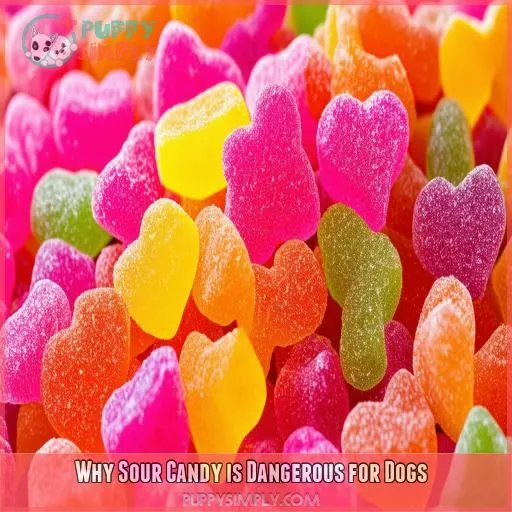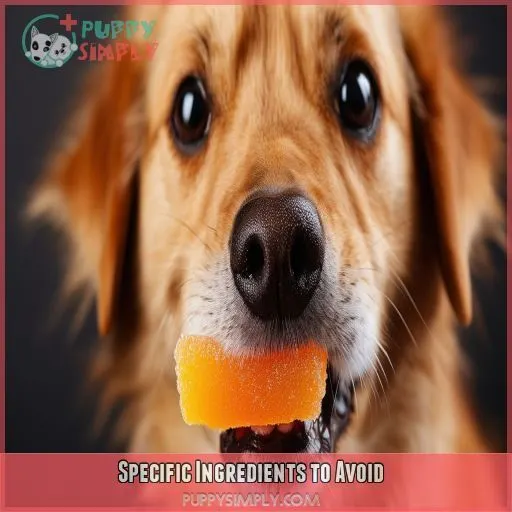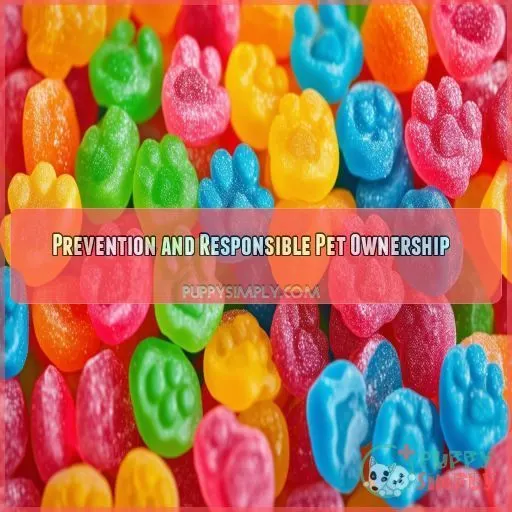This site is supported by our readers. We may earn a commission, at no cost to you, if you purchase through links.

These treats upset the stomach, lead to dental problems, and more in dogs. If, by mistake, your furry friend ingested the sour candy, please hasten to act—induce vomiting and rush to the vet immediately.
Keep these sweets out of your dog’s reach for his safety and well-being. Be a responsible pet owner
Table Of Contents
- Key Takeaways
- Can Dogs Eat Sour Candy?
- Why Sour Candy is Dangerous for Dogs
- Potential Health Risks of Dogs Eating Sour Candy
- Specific Ingredients to Avoid
- First Aid for Dogs Who Eat Sour Candy
- Prevention and Responsible Pet Ownership
- Frequently Asked Questions (FAQs)
- Can dogs eat Sour Patch Kids?
- Can dogs eat sour candy?
- Can dogs eat candy?
- Can dogs eat sugar free candy?
- Can dogs eat candy canes safely?
- How can I train my dog to avoid candy?
- Are there any safe human sweets for dogs?
- What natural treats can substitute candy for dogs?
- Can sour candy affect a dogs behavior long-term?
- Conclusion
Key Takeaways
- Don’t Play with Fire: Sour candies are a no-no for our furry pals. They’re like a ticking time bomb, loaded with sugar and toxic ingredients that can make your dog sick, grumpy, and even worse.
- Sugar Blues: Sour candies are like a sugar rush on steroids. They can send your dog into a frenzy, then crash them hard, leaving them feeling down and out.
- Tummy Troubles: The acidity and sugar in sour candies can wreak havoc on your dog’s tummy, causing vomiting, diarrhea, and other unpleasant surprises.
- Dental Disasters: Sour candies are like a sugar party in your dog’s mouth, but not in a good way. They can damage their teeth and gums, leading to pain and expensive vet bills
Can Dogs Eat Sour Candy?
No, dogs shouldn’t eat sour candy. It poses serious health risks. The high sugar content can lead to weight gain and diabetes, while citric acid in the candy can upset your dog’s stomach and erode their tooth enamel.
Worse, some sour candies contain xylitol, a sweetener that’s extremely toxic to dogs, causing liver damage and seizures. Eating sour candy can result in vomiting, diarrhea, and even choking.
If your dog does eat sour candy, contact your vet immediately. Keep your furry friend safe, and learn more about preventing such mishaps with a few proactive steps
Why Sour Candy is Dangerous for Dogs
Sour candy may seem like a harmless treat, but it can actually pose serious dangers for your canine companion.
The high sugar content and artificial sweeteners, like xylitol, can wreak havoc on your dog’s digestive system, leading to vomiting, diarrhea, and even pancreatitis.
The malic acid that gives sour candy its pucker-inducing punch can irritate your pup’s stomach and throat.
But the risks don’t stop there – the hard, chewy texture of some sour candies can also become a choking hazard.
If your dog manages to swallow a piece whole, it could cause a dangerous gastrointestinal blockage.
Potential Health Risks of Dogs Eating Sour Candy
Eating sour candy can cause several health problems in dogs, including gastrointestinal issues, dental problems, allergic reactions, and behavioral changes. Understanding these risks can help you make informed decisions to protect your pet’s health and well-being
Gastrointestinal Issues
Sour candy’s acidity and high sugar content can wreak havoc on your dog’s digestive system, leading to:
- Vomiting
- Diarrhea
- Pancreatitis
Consult your vet if your pup indulges in sour treats
Dental Problems
Dental problems are a significant concern. Sour candy can lead to enamel erosion and gum inflammation. Key issues include:
- Tooth decay from high sugar.
- Acidic environment wearing down teeth.
- Behavioral consequences from sweet cravings
Allergic Reactions
In addition to dental problems, sour candy can trigger allergic reactions in dogs. Ingredients like artificial colors and preservatives may cause itching, swelling, or even anaphylaxis. Always prioritize pet hygiene and consult a vet for emergencies
Behavioral Changes
Behavioral changes from sour candy in dogs can include:
- Hyperactivity and restlessness
- Mood swings and anxiety
- Long-term behavior issues
These issues might stem from sugar and artificial ingredients causing disruptions in their system
Specific Ingredients to Avoid
Some key ingredients your dog should avoid in sour candy include xylitol, citric acid, and high sugar content. These can be: dangerous for gastrointestinal health, destructive to liver health, and cause hypoglycemia.
Xylitol
Xylitol poisoning is a serious risk when dogs ingest sour candy. This artificial sweetener causes dramatic metabolic effects in dogs, such as liver damage and hypoglycemia. Remember these key dangers:
- Stomach obstruction
- Liver failure
- Seizures
- Potentially fatal consequences
Citric Acid
Citric acid, commonly found in sour candy, can cause digestive upset and harm your dog’s oral health. Look out for:
- Vomiting
- Diarrhea
- Tooth enamel erosion
- Increased thirst and dehydration
These issues highlight the dangers of giving dogs sour candy
High Sugar Content
The high sugar content in sour candy can lead to weight gain, increased diabetes risk, and other health issues for dogs. Prioritize your pup’s nutritional needs by avoiding sugary treats and providing a balanced, dog-friendly diet instead
First Aid for Dogs Who Eat Sour Candy
If your dog eats sour candy, you should induce vomiting within two hours to prevent absorption of harmful ingredients. Immediately seek veterinary care to address potential complications like xylitol poisoning or gastrointestinal distress
Induce Vomiting (within 2 Hours)
If your dog has ingested sour candy, he’ll need to be induced with vomiting within two hours to prevent any type of toxicity. To do so, use hydrogen peroxide (1 teaspoon per 5 pounds of body weight) to induce vomiting** only under the advice of your vet.
This immediate reaction will help in controlling the situation of toxicity. Making a home safe by keeping such dangerous food far from the pet’s reach can avoid such emergencies.
Induction of vomiting must be followed by consultation with the vet
Seek Veterinary Care
If your dog ingests sour candy, he should be taken to the vet immediately. Even tiny amounts could be pretty dangerous.
- Xylitol hazard: Toxicity needs immediate attention.
- Artificial sweeteners: Possibly harmful.
- Prevent ingestion: Keep candy out of reach.
- Symptom monitoring: Vomiting, diarrhea, lethargy.
- Emergency care: Essential for severe reactions.
Act quickly and do what’s essential to keep your puppy safe!
Prevention and Responsible Pet Ownership
Dog-proof your home and educate guests to create an environment safe from sour candy hazards. Give your pet a balanced and nutritious diet, avoiding human treats as much as possible.
Dog-proof Your Home
Keep unsafe candies, particularly sour candy, out of your dog’s reach. These candies should be stored in high cabinets or shelves to prevent them from being ingested accidentally. Then, there are fewer chances of hazards due to the intake of candies and all hazards related to food.
Educate Guests
Do let your guests know ahead of time that you have dog allergies and about keeping them safe from being fed dangerous treats like sour candy. Also, make sure to dispose of all wrapper pieces for candies to prevent accidental consumption and ensure the health of your dog.
Provide a Balanced, Nutritious Diet
Ensuring your dog has a balanced, nutritious diet is key to responsible pet ownership. Research safe treats, adhere to portion control measures, and consult a veterinarian for nutritional advice to support your dog’s overall health.
- Avoidance techniques
- Safe treats research
- Socialization habits
- Portion control measures
- Nutritional consult
Avoid Feeding Human Treats
Avoid feeding human treats to your dog to prevent sugar addiction, hypoglycemia risk, and behavioral consequences. Focus on weight management and cognitive health. Check this quick guide:
| Human Treat | Risk Level | Alternative |
|---|---|---|
| Sour Candy | High | Dog-safe treats |
| Chocolate | Severe | Carob-based treats |
| Grapes/Raisins | Severe | Blueberries |
Frequently Asked Questions (FAQs)
Can dogs eat Sour Patch Kids?
Dogs shouldn’t eat Sour Patch Kids due to their high sugar and artificial ingredient content. These candies can cause gastrointestinal issues, and if they contain xylitol, they can be toxic and potentially fatal to dogs
Can dogs eat sour candy?
It’s a slippery slope. Dogs shouldn’t eat sour candy due to its high sugar and acidity, harmful ingredients like xylitol, and lack of nutritional value. It causes digestive issues, weight gain, and potentially severe health risks
Can dogs eat candy?
No, dogs shouldn’t eat candy. It often contains harmful ingredients like xylitol, high sugar, and artificial additives that can cause severe health issues, including gastrointestinal distress, low blood sugar, and even liver damage
Can dogs eat sugar free candy?
Feeding your dog sugar-free candy is like playing Russian roulette with their health. These treats often contain xylitol, which can cause life-threatening hypoglycemia and liver damage. Always keep them out of reach
Can dogs eat candy canes safely?
No, dogs shouldn’t eat candy canes. They’re high in sugar and may contain xylitol, toxic to dogs. Even small amounts can cause serious health issues including liver damage and hypoglycemia. Stick to pet-safe treats
How can I train my dog to avoid candy?
You can train your dog to avoid candy by using commands, reinforcing positive behavior with treats, and creating barriers, like keeping candy out of reach. Always supervise and correct their behavior gently but firmly
Are there any safe human sweets for dogs?
You shouldn’t give your dog human sweets, as they often contain harmful ingredients. Instead, offer pet-safe treats like apple slices, blueberries, or specially formulated dog treats. They’re healthier and won’t risk their health
What natural treats can substitute candy for dogs?
Imagine your dog’s delight with fresh carrot sticks, crisp apple slices (avoid the seeds), or pumpkin puree. These natural treats offer great taste, essential nutrients, and peace of mind, ensuring your pup’s health and happiness
Can sour candy affect a dogs behavior long-term?
Sour candy can affect your dog’s behavior long-term by causing excitability and hyperactivity due to the high sugar content and artificial sweeteners. Consistently consuming it might lead to dental issues and chronic gastrointestinal problems
Conclusion
In conclusion, no dog will ever be exposed to sour candy. On the brighter side, the chance of toxic ingredients and high sugar in candy outweigh its benefits.
Being a good owner, keep these enticing treats from your pet’s reach and maintain a healthy and nutritious diet for him. With such precautions, you can ensure your canine companion stays healthy and fit











